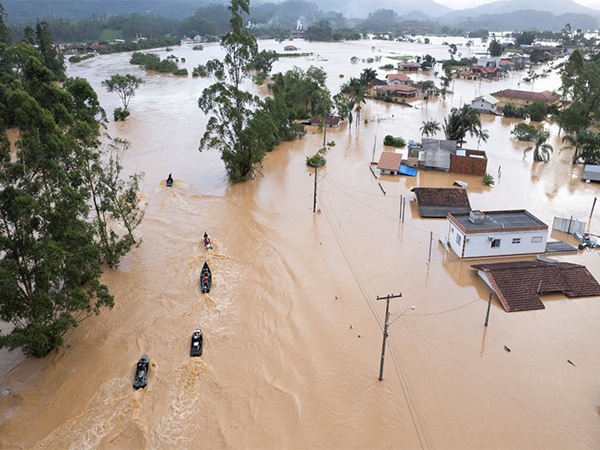
Dhaka: About 1.8 million people in northeast Bangladesh are stranded due to extensive flooding after weeks of heavy rains that have submerged homes and devastated farmland, CNN reported citing state media and humanitarian agencies.
The video clip shows large areas of Sylhet city and nearby Sunamganj are underwater, marking the second wave of flooding in less than a month, state-run news agency Bangladesh Sangbad Sangstha (BSS) reported Saturday.
Prolonged torrential rains and runoff from upstream hilly regions on the Indian border caused four rivers to swell beyond their danger levels, the Water Development Board said last week.
Villagers in the hardest-hit low-lying areas of Sylhet could be seen wading through chest-deep water and heaping their belongings into piles to protect them from the muddy waters.
According to Bangladeshi local media, there is concern for those trapped by floodwaters who now face food shortages and a lack of clean water.
About 964,000 people in Sylhet and 792,000 in Sunamganj have been affected by the flooding, with authorities setting up over 6,000 shelters for the displaced, BSS reported.
UNICEF reported on June 21 that 772,000 children are in urgent need of assistance. Over 800 schools have been flooded, and 500 more are being used as flood shelters, as per CNN.
BRAC, an international development organization, is providing emergency food and health support to hundreds of families in Sylhet and Sunamganj. The flash floods have affected about 2.25 million people and left 12,000 without power.
Khondoker Golam Tawhid, program head of BRAC's Disaster Risk Management Program said flooding in the country is "becoming more dangerous" with "huge losses to livelihoods, biodiversity and infrastructure -- and interruption to schooling and health services."
"Bangladesh is used to flooding, but climate change is making floods more intense and less predictable, making it impossible for families to stay safe, let alone plan ahead," Tawhid said.
Meanwhile, fish farmers have faced significant losses as floodwaters wash away thousands of farms and ponds, with local media reporting an economic toll of over Bangladeshi currency (Taka) Tk 11.4 million.
Densely populated and low-lying Bangladesh is prone to seasonal rains, flooding and cyclones.
Monsoon rains and landslides have also affected southern Bangladesh, where about a million people from the Rohingya Muslim community are living in the world's biggest refugee camps, having fled persecution and violence in neighbouring Myanmar.
According to Bangladesh's Ministry of Disaster Management and Relief, at least 10 people, including three children, died from mudslides and heavy rainfall in the refugee camps near Cox's Bazar on Wednesday.
"People have been evacuated from the low-lying areas and at least 500 people have been shifted to other relief centers," Hasan Sarwar, head of the refugee cell for the ministry told CNN last week.
Many Rohingya refugees live in bamboo and tarpaulin shelters perched on hilly slopes that are vulnerable to strong winds, rain, and landslides.
Save the Children said about 8,000 people in 33 camps have been impacted by the torrential downpours, which have destroyed or damaged more than 1,000 shelters.